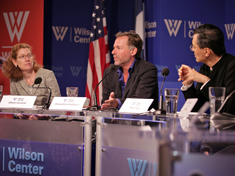-
Alexandros Washburn on How Smart City Technologies Can Help Coastal Cities Prepare for Climate Change
June 27, 2014 By Schuyler Null
As Hurricane Sandy bore down on New York in October 2012, the city’s chief urban designer was at home in Brooklyn deciding whether or not to evacuate. In the end, Alexandros Washburn decided to stay.
As Hurricane Sandy bore down on New York in October 2012, the city’s chief urban designer was at home in Brooklyn deciding whether or not to evacuate. In the end, Alexandros Washburn decided to stay.
“As a designer, you want to experience what it is you’re designing for,” Washburn says in this week’s podcast. He wanted to see the rate and patterns of flooding firsthand – the storm surge “came on faster than you were expecting, and it made you panic,” he says.
Cities continue to grow while their vulnerability to climate change is increasingWashburn is one of four authors from around the world featured in a new Wilson Center publication on “smart cities,” the idea that harnessing ubiquitous, networked computer technology and data analytics can create more efficient and resilient cities.
Some see the rise of smart cities as the next major paradigm shift in urban planning, as cities continue to grow while at the same time their vulnerability to climate change is increasing.
“Very often, we’ll see the idea of a smart city in a glossy commercial where the lights always turn green, the elevator’s always working for you,” says Washburn, who now directs the Center for Coastal Resilience and Urban Excellence (CRUX) at the Stevens Institute of Technology. “That doesn’t happen, that’s not a reality.”
To Washburn, the most “seductive” potential of smart city technologies is in speeding up the decision-making process of government. “Everything that I think of in terms of ‘smartness’ has to do with [asking], ‘How do you make a choice?’”
“The worst thing for decision-making is to panic,” says Washburn, recalling the water starting to rise in Brooklyn. “You panic when you feel like events are overtaking you, so we have to speed up decision-making so that we stay ahead of events.”
“We can decide in weeks rather than years, and not be overtaken by events”“For New York right now, we need protection from storm surge,” he says. CRUX has been placing sensors all around New York Harbor to collect real-time and predictive storm surge data. Their goal is to not only monitor the harbor but use the data to build a model that can help the city – and others like – prepare for more storms like Hurricane Sandy.
“If smart technology can be useful for us, it will be something that will let us sense better, visualize better,” Washburn says, so “we can decide in weeks rather than years, and not be overtaken by events…and have the confidence to make the right decisions because we have the technology to support us.”
Of course, there is a risk in becoming over-reliant on technology in decision-making. “We’re approaching the point where we can use smart technology to make decisions faster, but we can’t ever afford to close the loop” and cut people out of the process, he says. When it comes to cities, it’s important to remember that “you’re using smart technology not to control a device, but to control a system. To control a device is technology; to control a city is politics.”
Washburn spoke at the Wilson Center on June 23.
Friday podcasts are also available for download on iTunes.
 A Publication of the Stimson Center.
A Publication of the Stimson Center.




